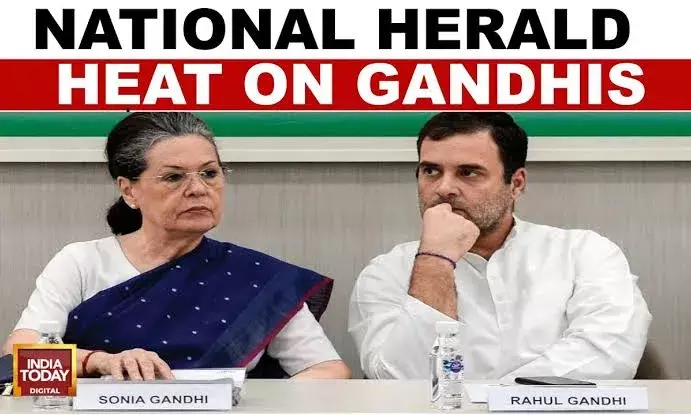ED’s Chargesheet in National Herald Case: Lawful Pursuit or Political Weapon?
The Enforcement Directorate's recent charge sheet against Sonia Gandhi and Rahul Gandhi in the National Herald money laundering case raises questions about the impartiality and efficiency of India's central investigative agencies.;

The Enforcement Directorate’s recent charge sheet against Sonia Gandhi and Rahul Gandhi in the National Herald money laundering case has brought India’s central investigative agencies back under public scrutiny, reigniting debates about their impartiality, efficiency, and the deepening intersection of politics and law enforcement. At the heart of this controversy lies a larger question — are these agencies functioning as neutral upholders of justice, or have they gradually morphed into instruments of political retribution under successive governments?
The National Herald case, which originated from a private complaint by BJP leader Subramanian Swamy in 2012, alleges that Congress leaders misused party funds to acquire Associated Journals Limited (AJL), the publisher of the defunct National Herald newspaper, through a company called Young Indian, in which Sonia and Rahul Gandhi hold majority stakes. The ED's charge sheet, filed after years of investigations and summons, claims money laundering and financial irregularities in this acquisition. While legality must be tested in court, the timing and manner of the ED's moves have raised inevitable political questions, particularly as it coincides with upcoming elections in several states and the 2024 general elections just behind us.
It is important to examine this case within a wider pattern of central agency activity in India. Data reveals a disproportionate rise in Enforcement Directorate actions over the past decade. Between 2015 and 2025, the ED has conducted over 3,000 raids under the Prevention of Money Laundering Act (PMLA). However, convictions in these cases remain shockingly low, with official figures suggesting less than 1% success. This discrepancy between investigation and conviction raises serious concerns about either the quality of investigations or the selective targeting of cases designed more for political effect than legal outcome.
This perception is further reinforced by the selective nature of the ED and CBI’s attentions. A majority of cases have tended to focus on leaders and parties opposed to the ruling regime at the Centre. Chief Ministers, ministers, and political leaders from states like West Bengal, Tamil Nadu, Jharkhand, Kerala, Maharashtra, and Bihar have been frequent targets of sudden raids and arrests. Leaders such as Mamata Banerjee’s nephew Abhishek Banerjee, DMK minister Senthil Balaji, and former Maharashtra minister Anil Deshmukh, among others, have all faced ED action at politically sensitive junctures. This consistent pattern of political proximity to opposition ranks being a common thread among ED targets is difficult to ignore.
In this context, the charges against the Gandhis too are being viewed as part of this trend. Political observers argue that since 2014, the Congress leadership has been systematically harassed to weaken the grand old party’s organisational and electoral standing. The Gandhis, being symbolic figures in Indian politics, when caught in prolonged legal battles, naturally draw media and public attention, shifting the narrative and thereby aiding in the decimation of opposition morale. Senior Congress leader Jairam Ramesh has already called this chargesheet “political vendetta disguised as investigation,” while party spokespersons point to the ED’s silence on cases against certain BJP leaders, despite similar complaints pending for years.
The growing public perception that central agencies are not acting independently but rather at the behest of the ruling establishment are backed by surveys and legal experts’ commentary. A recent survey by Lokniti-CSDS suggested that over 60% of respondents believe that agencies like ED and CBI work under political pressure. Former Supreme Court judge Justice Madan Lokur has remarked on multiple occasions about the need for greater autonomy and accountability mechanisms for investigative agencies, warning that their misuse risks eroding constitutional balance and democratic health.
At a deeper level, this crisis is not just about one case or one agency. It reflects the structural vulnerability of India’s institutions in the face of executive overreach. Agencies like the ED and CBI function under the administrative control of the central government, which creates an inherent conflict of interest when their investigations involve political figures. Although the Supreme Court has repeatedly called for insulating investigative agencies from political control, practical implementation remains elusive. The appointment, transfer, and operational oversight of top officers continue to lie with the Centre, making them susceptible to political manipulation.
To compound this, the slow pace of judicial proceedings often turns legal processes into punitive mechanisms. When investigations stretch for years without resolution, the mere act of being under investigation becomes a tool of harassment, irrespective of the final verdict. This has happened in the cases of many political leaders, including the National Herald case, where despite over a decade of proceedings, no court has delivered a decisive judgment. The chargesheet, even now, represents only an accusation — yet politically, it carries the weight of a conviction in public perception.
For a vibrant democracy like India, such trends are worrying. The legitimacy of law enforcement agencies rests on public trust, which erodes when there is a perception of bias. If agencies become weapons of political vendetta, they lose their deterrent value against genuine crime and corruption. In the long run, this also weakens governance by replacing institutional checks and balances with arbitrary executive power.
The filing of the chargesheet against Sonia Gandhi and Rahul Gandhi should ideally be a matter of legal merit alone. Nevertheless, in India’s current political climate, where investigative agencies appear as actors in electoral theatre, it is difficult to view such developments in isolation. Whether the National Herald case is an earnest pursuit of financial accountability or another chapter in the misuse of investigative authority will ultimately be judged by the courts. Until then, the credibility crisis surrounding India’s central agencies only deepens.

